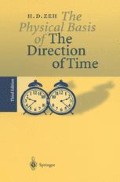Abstract
The concept of time has been discussed since the earliest records of philosophy, when science had not yet become a separate subject. It is rooted in the subjective experience of the ‘passing’ present or moment of awareness, which appears to ‘flow’ through time and thereby to separate dynamically the past from the future. This has led to the formal representation of time by the real numbers, and of the present by a point that ‘moves’ in the direction characterized by their sign.
Access this chapter
Tax calculation will be finalised at checkout
Purchases are for personal use only
Preview
Unable to display preview. Download preview PDF.
Author information
Authors and Affiliations
Rights and permissions
Copyright information
© 1999 Springer-Verlag Berlin Heidelberg
About this chapter
Cite this chapter
Zeh, H.D. (1999). The Physical Concept of Time. In: The Physical Basis of The Direction of Time. Springer, Berlin, Heidelberg. https://doi.org/10.1007/978-3-662-03805-5_2
Download citation
DOI: https://doi.org/10.1007/978-3-662-03805-5_2
Publisher Name: Springer, Berlin, Heidelberg
Print ISBN: 978-3-540-64865-9
Online ISBN: 978-3-662-03805-5
eBook Packages: Springer Book Archive

